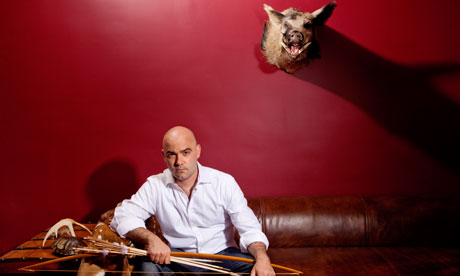The Son by Philipp Meyer – review

In his 2001 memoir, Walter Benjamin at the Dairy Queen, Larry McMurtry offers a succinct, yet highly poignant, account of the inherent tragedy of Texan culture, culminating in the observation that “the first explorers, marvelling at the glories of the west, began to destroy those glories as soon as they got across the Mississippi”. Such destruction is by no means confined to the Lone Star State, of course, but in Texas it is magnified by the sheer scale of the misadventure, and an underlying sense of futility that comes when we think of how much was squandered for the profit of the most corrupt.
In the first few pages of The Son, Philipp Meyer’s followup to the highly praised American Rust, a 100-year-old man called Eli McCullough describes the Texas he knew, before its glories were trampled: “the land and all the animals who lived upon it were fat and slick. Grass up to the chest, the soil deep and black in the bottoms and even the steepest hillsides overrun with wildflowers … the country was rich with life the way it is rotten with people today.” Eli had come to Texas as the child of pioneer settlers, but was abducted by Comanche warriors, with whom he lived for some years before returning to the white world to build a cattle and oil empire by the usual methods of armed landgrab and state-sanctioned illegality favoured by empire-builders everywhere. The rise and fall of that empire, and the moral and psychological costs its maintenance imposes on five subsequent generations of McCulloughs, is the subject ofThe Son, a work of extraordinary narrative power and contrasts, in which destruction seems inevitable and enjoyment of victory’s fleeting pleasures bittersweet at best. As Eli remarks to his son, Peter, a decent man struggling with the morality of power, “that is the story of the human race. Soil to sand, fertile to barren, fruit to thorns. It is all we know how to do.”
Even with our limited historical perspectives, we are all too aware that, as the book’s epigraph from Edward Gibbon asserts: “fortune … buries empires and cities in a common grave” – so we grab what we can and cling to it, spouting dog-eat-dog folk wisdom while sticking it to the competition. In such a climate, Peter cannot command the respect of hisvaqueros or his neighbours; though he treats them well, they prefer his ruthless, magisterial father, and he quickly succumbs to the idea that any attempt to change the imperial status quo is bound to seem “undignified, or suspicious, or weak”. Gibbon also notes: “As long as mankind shall continue to bestow more liberal applause on their destroyers than their benefactors, the thirst of military glory will ever be the vice of the most exalted characters.” By this logic, the McCulloughs, having grown rich and powerful, are inevitably locked into a system of violence and expropriation, in which any thought of justice or mercy becomes untenable. As Peter wryly remarks: “Everyone loves the underdog. Until they have to take his side.”
That the getting of power should isolate five generations of McCulloughs in a virtual prison of moral cowardice and ruthless self-preservation is doubly ironic, when we remember that, during his time with the Comanche, Eli’s surrogate father, Toshaway, had instructed him so carefully in a true warrior’s duty to others. “I will tell you something my father once told me. The difference between a brave man and a coward is very simple. It is a problem of love. A coward loves only himself … The brave man loves other men first and himself last.” Yet, though he succeeds for a few years in becoming “mostly the same” as his adoptive tribe, Eli fails to embody the ethic that Toshaway had tried to instill – as his subsequent actions against anyone else who gets in the way of his empire building reveal. The most poignant outcome of this failure in fellow feeling is the effect it has on Peter, who tries to do the right thing, but ends up consoling himself with the thought that “one day we will all be nothing but marks in stone. Iron stains of blood, black of our carbon, a hardening clay.” It is a painful conclusion, yet the power of this remarkable and beautifully wrought novel is that we remember, in its careful dissection of imperial power, our innate potential for moral courage and companionship.
• John Burnside’s latest book is Black Cat Bone (Jonathan Cape). Philipp Meyer appears at the Edinburgh international book festival on 10 August.
How to submit an Op-Ed: Libyan Express accepts opinion articles on a wide range of topics. Submissions may be sent to oped@libyanexpress.com. Please include ‘Op-Ed’ in the subject line.
- Libya and US explore $70 billion investment prospects - July 24, 2025
- UN envoy meets AU officials to align efforts on Libya - July 24, 2025
- Iran warns off USS Fitzgerald in Gulf, state media reports - July 24, 2025


